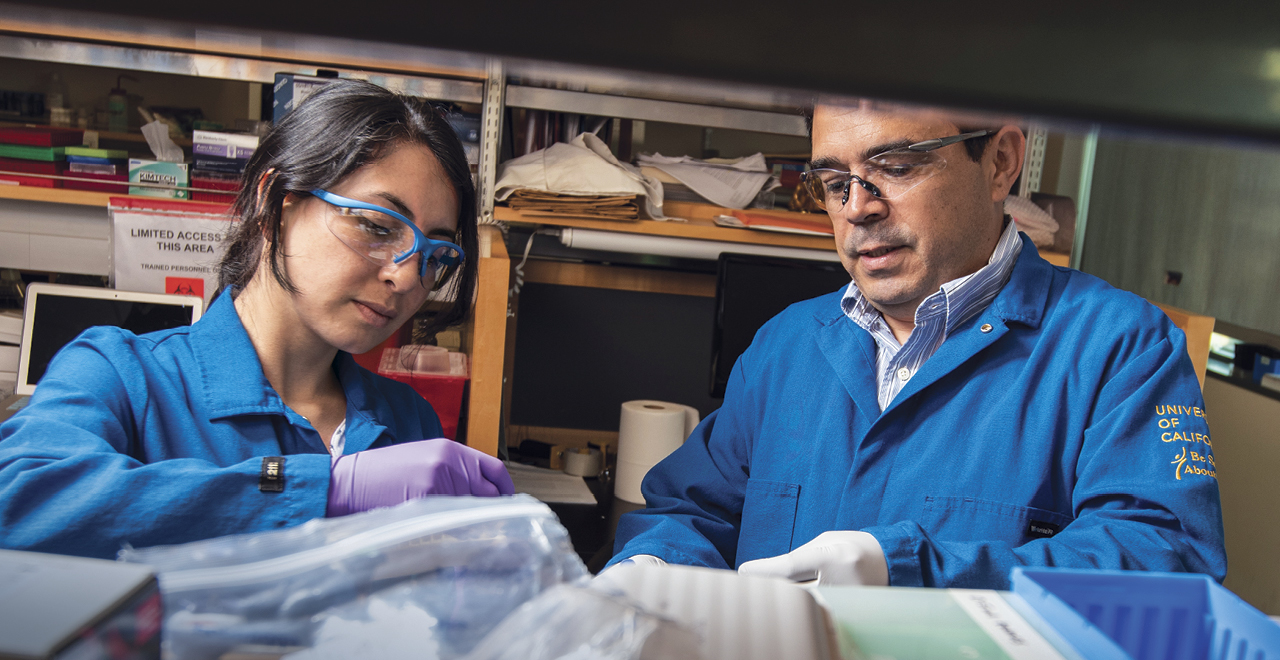Beating a deadly cancer in Hispanics
Luís Carvajal-Carmona finds new gene targets for treatment
One million people worldwide will be newly diagnosed with gastric cancer this year and 720,000 people will die from the disease, making it the third leading cause of cancer deaths globally. Most people who receive this diagnosis will already be in the advanced stages of the disease, facing a dismal 5-year survival rate of 5 percent.
A team led by cancer center researcher Luís Carvajal-Carmona is working to change those statistics by studying the tumors of Hispanic patients with a family history of gastric cancer.
“Hispanics carry among the highest burden of gastric cancer worldwide,” says Carvajal-Carmona, an associate professor of biochemistry and molecular medicine and a member of the Genome Center. “In the U.S. they are twice as likely to be diagnosed and twice as likely to die once they are diagnosed, when compared to whites.”
In August, Carvajal-Carmona and his cancer center colleagues were awarded a 5-year, $2.65 million grant from the National Cancer Institute to study gastric cancer genetics in Hispanic populations around the world. Up to 15 percent of individuals with gastric cancer have a family history of the disease. If scientists can identify the genes whose mutations lead to it, there is hope of both disease prevention and better treatments.
“Right now, there are only two FDA-approved drugs for the treatment of gastric cancer. Genetic studies of Hispanics are one of the world’s best hopes for both identifying at-risk individuals and new drug targets,” says Carvajal-Carmona, who also co-leads the cancer center’s Population Sciences and Health Disparities Research Program.
“It is my vision that our research group and our great cancer center become leaders in gastric cancer genetics and genomics,” he says. “Our goal is to generate a body of data that can be used in clinical trials of drugs, as in genetic screening, early detection and disease prevention.”
Last year, Carvajal-Carmona and his colleagues made an important contribution to the field when they helped to firmly establish that PALB2, a gene involved in DNA repair, is a gastric cancer gene. In the 20 years prior to that, only one gene, CDH1, had been identified as being associated with gastric cancer.
“This body of data makes a good case for offering PALB2 testing to families with gastric cancer,” he says.
In a 2017 paper published in Gastroenterology, Carvajal-Carmona and his team reported the findings of a study in which they sequenced all of the protein-coding genes in the genomes of 22 families with hereditary gastric cancer who had previously tested negative for harmful variants of CDH1. In addition to PALB2, the team found that mutations in BRCA1, a gene known to be involved in breast and pancreatic cancer, and RAD51C increase the risk for the disease. All three genes are involved in what is called homologous recombination (HR) DNA repair, a mechanism cells use to repair potentially harmful breaks that involve both strands of DNA.
As part of the planned studies funded by the new grant, the team will study HR pathway genes in DNA from hundreds of Hispanics with familial and early-onset gastric cancer diagnosed before age 50. The team also will sequence genes from tumors taken from Hispanic patients and compare the results to their own normal DNA. Finally, the team will carry out molecular characterization of HR-deficient gastric cancer tumors from Hispanics. They will be looking for associations among the kinds of tumors, clinical manifestations and risk factors.
The results from this part of the newly funded research program have the potential to impact both the prevention and treatment of gastric cancer, Carvajal-Carmona says. The team’s preliminary studies suggest that one in five Hispanic tumors are HR-deficient. Characterizing the HR pathway mutations in these tumors will likely suggest drug targets, as well as offer new gene mutations to help identify at-risk individuals.
Carvajal-Carmona says this kind of research is important for reducing health disparities worldwide — and closer to home. Most of what researchers know about gastric cancer genetics is based on studying tumors from Asian and non-Hispanic white patients. Carvajal-Carmona points out that it won’t be long before there are more Hispanics than whites in California.
“We have to start filling these knowledge gaps and allow all populations to benefit from the science we are doing,” he says. “While the data will be obtained from Hispanic patients, the findings of our study will advance research and treatment in both Hispanic and non-Hispanic patients.”


